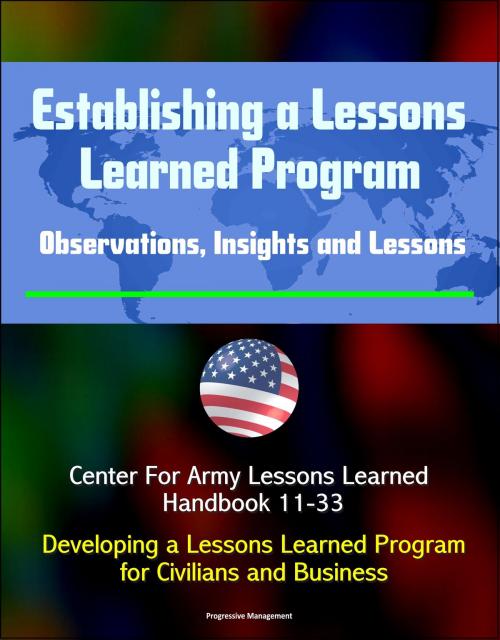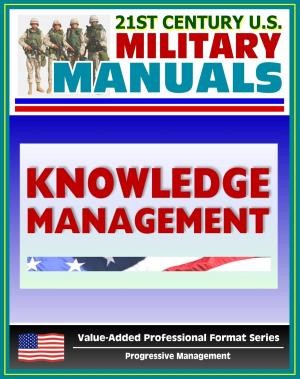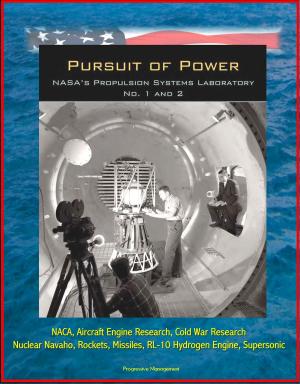Establishing a Lessons Learned Program: Observations, Insights and Lessons - Center For Army Lessons Learned Handbook 11-33 - Developing a Lessons Learned Program for Civilians and Business
Business & Finance, Management & Leadership, Management| Author: | Progressive Management | ISBN: | 9781310424823 |
| Publisher: | Progressive Management | Publication: | October 31, 2014 |
| Imprint: | Smashwords Edition | Language: | English |
| Author: | Progressive Management |
| ISBN: | 9781310424823 |
| Publisher: | Progressive Management |
| Publication: | October 31, 2014 |
| Imprint: | Smashwords Edition |
| Language: | English |
This handbook provides leaders and members of an organization with a "how-to" guide for establishing a lessons learned (LL) capability. It promises to detail what the LL process is and how to apply all the available tools to establish your own LL program. Different organizations in the LL community vary terms that are not necessarily consistent. This handbook attempts to simplify and explain these terms to satisfy the development of a generic LL capability. In developing this LL handbook, the Center for Army Lessons Learned (CALL) drew from the experience and techniques used by the Army, Marines, Air Force, NATO, and other U.S. government agencies. It examined the processes in place to collect, analyze, disseminate, and archive observations, insights, lessons, and best practices and distilled them down to a simplified list of functions any organization could choose from to establish an effective program that fits its level of resourcing. The goal of this handbook is to provide a one-source document that anyone can use to understand how a basic program is achieved to improve organizational effectiveness.
All organizations must learn to adapt and change. An enabler to do this is understanding the value of a lesson learned. The military has been a leader in understanding the vital importance of an LL capability. LL processes have been used in commercial, government, and military organizations since the late 1980s to capture, store, and share experiential working knowledge.
Although this is a CALL product, it is not a primer on how CALL does business. We believe this handbook will have applicability for military, government, and civilian organizations that want to develop an LL capability. Although it does use some military examples, we will try to demystify military terminology and keep the explanations as basic and simple as possible.
There are three chapters in this handbook, followed by a series of appendices. Chapter 1 briefly discusses what an LL program is and why you should have one. Chapter 2 outlines the functions of an LL program. Chapter 3 discusses the organizational considerations involved when establishing a program. In the appendices, you will find examples of how other LL centers operate their programs and supplemental information on after action reviews/reports, collection plans, and interviews.
Introduction * Chapter 1 - Why a Lessons Learned Program? * Chapter 2 - Functions of a Lessons Learned Capability * Chapter 3 - Organizational Considerations * Appendix A - Sample Detailed Collection Plan Format * Appendix B - Oral Interview Techniques * Appendix C - Military After Action Reviews/Reports * Appendix D - Government Agencies and Lessons Learned Centers
This handbook provides leaders and members of an organization with a "how-to" guide for establishing a lessons learned (LL) capability. It promises to detail what the LL process is and how to apply all the available tools to establish your own LL program. Different organizations in the LL community vary terms that are not necessarily consistent. This handbook attempts to simplify and explain these terms to satisfy the development of a generic LL capability. In developing this LL handbook, the Center for Army Lessons Learned (CALL) drew from the experience and techniques used by the Army, Marines, Air Force, NATO, and other U.S. government agencies. It examined the processes in place to collect, analyze, disseminate, and archive observations, insights, lessons, and best practices and distilled them down to a simplified list of functions any organization could choose from to establish an effective program that fits its level of resourcing. The goal of this handbook is to provide a one-source document that anyone can use to understand how a basic program is achieved to improve organizational effectiveness.
All organizations must learn to adapt and change. An enabler to do this is understanding the value of a lesson learned. The military has been a leader in understanding the vital importance of an LL capability. LL processes have been used in commercial, government, and military organizations since the late 1980s to capture, store, and share experiential working knowledge.
Although this is a CALL product, it is not a primer on how CALL does business. We believe this handbook will have applicability for military, government, and civilian organizations that want to develop an LL capability. Although it does use some military examples, we will try to demystify military terminology and keep the explanations as basic and simple as possible.
There are three chapters in this handbook, followed by a series of appendices. Chapter 1 briefly discusses what an LL program is and why you should have one. Chapter 2 outlines the functions of an LL program. Chapter 3 discusses the organizational considerations involved when establishing a program. In the appendices, you will find examples of how other LL centers operate their programs and supplemental information on after action reviews/reports, collection plans, and interviews.
Introduction * Chapter 1 - Why a Lessons Learned Program? * Chapter 2 - Functions of a Lessons Learned Capability * Chapter 3 - Organizational Considerations * Appendix A - Sample Detailed Collection Plan Format * Appendix B - Oral Interview Techniques * Appendix C - Military After Action Reviews/Reports * Appendix D - Government Agencies and Lessons Learned Centers















